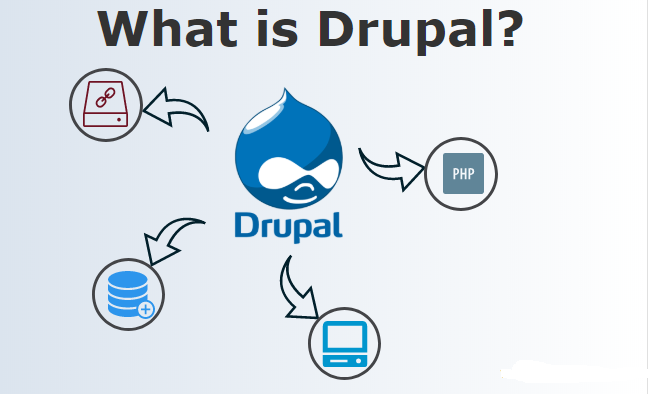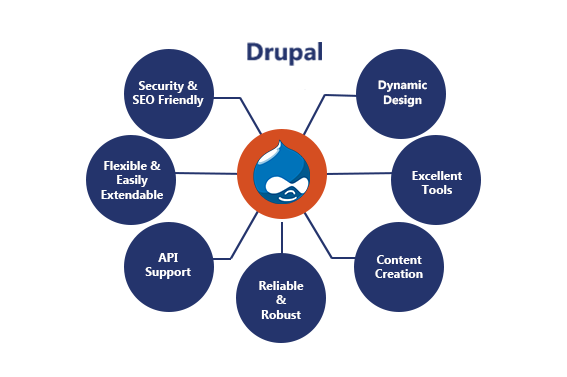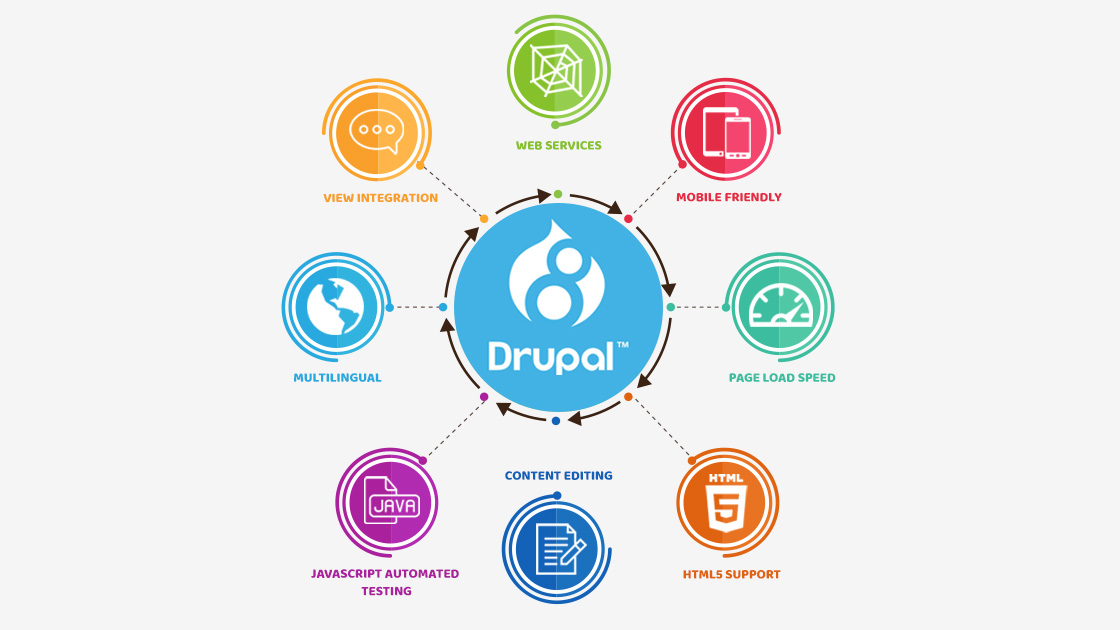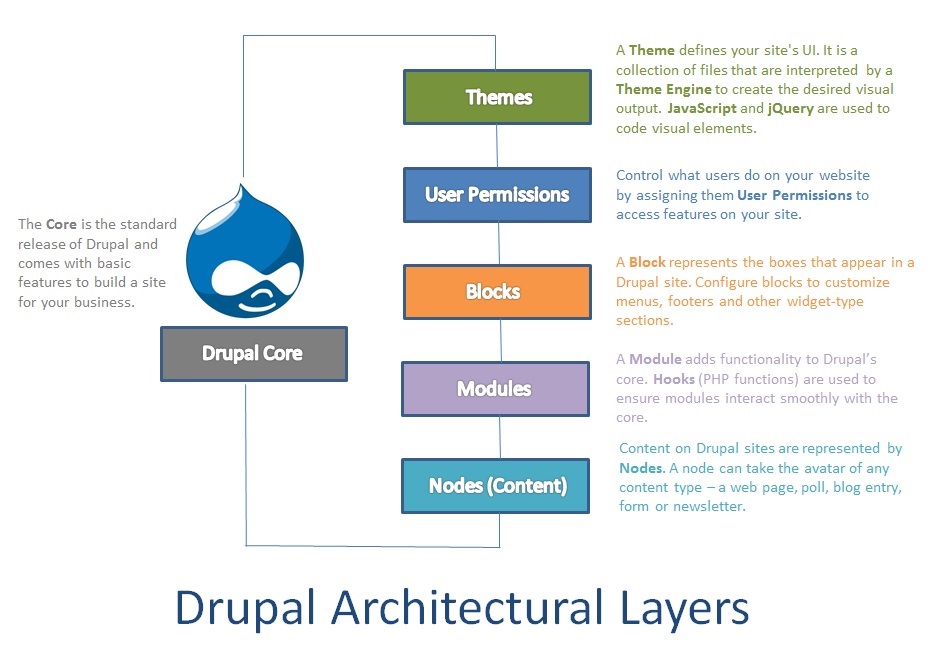Why Drupal Hosting
Looking for reliable and performance-driven Drupal hosting services?Our top-notch hosting solutions offer seamless compatibility with Drupal, ensuring fast loading times, high uptime, and secure environments.
With optimized servers and expert support, we empower your Drupal website to reach its full potential in search engine rankings.
Unlock the power of Drupal with our tailored hosting packages and take your online presence to new heights. Sign up today and experience the difference in performance and SEO rankings!
- Content Distribution & Management
- Developer Focused
- Impenetrable Security
- Cross-Platform Portability
- Social Media Interactivity
- Monetization and ROI
- SEO Friendly
Product Category: Hosting > Product Name: DRUPAL
Product Description
Drupal is an open-source content management software (CMS) that is used to build websites and was created in 2001 by two University of Antwerp Students. It's distributed for free under the GNU General Public License, with no licensing fees.
Build, support, and manage Drupal applications in one platform. A fully-managed hosting platform optimized for Drupal, complete with all the tools your team needs to launch exceptional digital experiences faster.
DRUPAL Features
Drupal powers the best of the web, with a state-of-the art feature set that scales from the simple to the complex, and is highly secure. Proudly open-source.
Content Authoring
Connect to marketing automation, CRM, email marketing, analytics, optimization and other solutions. Build and manage sites, multichannel digital experiences, shopping experiences, tailored mobile Web browsers and native mobile apps. With Web services support, Drupal functions as a content repository that's accessible through an API.
Performance & Scaling
Drupal’s built-in performance features — combined with a modern CDN provider — perform well under the pressure of load-balancing, supercharged databases and advanced caching. This scalability means Drupal delivers consistently across platforms — addressing the growing need for mobile to render quickly and effectively.
Marketing Automation
Drupal can help with your results, including: Real-time sales alerts; Data management in Bulk.Track site traffic, and how many conversions or sign-ups have been achieved for a particular day, week, month or even year—or data in real time. Attract, engage and delight customers with relevant, helpful and personalized content and services. Drive your strategy forward.
Content as a Service
Drupal’s open architecture and APIs provide developers both a tool and framework for for creating feature-rich deliverables.
Personalization
Drupal helps: Provide a customized experience Segment visitors across devices with a focus on the important user personas for your business goals Track and report with A/B and multivariate testing Increase ROI through target marketing
Drupal Optimization
The hosting platform will be fine-tuned to work exceptionally well with Drupal. It will have a deep understanding of Drupal's requirements and architecture, which can lead to improved performance and reliability.
Automated Updates
Regular Drupal core and module updates are essential for security and performance. A managed hosting platform should handle these updates automatically, ensuring that your applications stay secure and up-to-date.
One-Click Installs
The platform should offer easy and quick installation of Drupal instances with just a few clicks, saving you time and effort.
F.A.Q
Frequently Asked Questions
Clear your Doubts Right Now.
-
What is Drupal Hosting?
Drupal is a free and open-source web content management system written in PHP and distributed under the GNU General Public License.
-
What is Drupal used for?
Drupal is a free, open source content management system (CMS) to build and maintain websites, online directories, e-commerce stores, intranets and other types of digital content. It can be used by individuals or groups of users and is a useful CMS for developers, marketers and agencies.
-
Is Drupal a CMS or framework?
Drupal is a flexible CMS based on the LAMP stack, with a modular design allowing features to be added and removed by installing and uninstalling modules, and allowing the entire look and feel of the website to be changed by installing and uninstalling themes.
-
Is Drupal a programming language?
Drupal is written in PHP, so it will run on any web server that supports the PHP programming language, e.g., Apache, Nginx, Microsoft IIS, etc. For development purposes only, even the web server built into PHP.
-
What kind of tool is Drupal?
Drupal is content management software. It's used to make many of the websites and applications you use every day. Drupal has great standard features, like easy content authoring, reliable performance, and excellent security. But what sets it apart is its flexibility; modularity is one of its core principles.
-
Why is it called Drupal?
The name Drupal was derived from the English pronunciation of the Dutch word "druppel," which means "drop." It needed a symbol too, so Kristjan Jansen and Steven Wittens stylised a Druplicon with eyes, curved nose and a mischievous smile.
-
What database is used by Drupal?
MySQL, MariaDB, or Percona Server (Recommended)
Note: Drupal itself will generally operate with a default MariaDB/MySQL configuration. A more complex site will likely require configuration changes for the database. You can solve these common configuration issues using this documentation. -
What is headless Drupal?
Headless Drupal, also known as Decoupled Drupal, is an architectural approach that decouples the frontend and backend of a website. In traditional Drupal setups, Drupal handles both the frontend (presentation layer) and backend (content management and logic). However, with headless Drupal, the two aspects are separated, providing more flexibility and enabling the use of various frontend technologies.
-
What are the benefits of headless Drupal?
- Flexibility: Developers have the freedom to choose the best frontend technologies for their specific project. They can use modern JavaScript frameworks or other frontend tools that suit their requirements.
- Improved Performance: Headless Drupal can deliver a faster user experience since the frontend is optimized for performance, and there's no traditional Drupal theme layer that might slow down page rendering.
- Cross-Platform Capability: With a headless approach, content from Drupal can be easily consumed by various devices and platforms, such as web browsers, mobile apps, IoT devices, and more.
- Scalability: The decoupled architecture allows you to scale the frontend and backend independently, providing greater scalability and performance as your website's traffic and complexity grow.
- Future-Proofing: Separating the frontend from the backend ensures that you can upgrade or change one aspect without affecting the other. This future-proofing capability is beneficial for long-term website development and maintenance.





